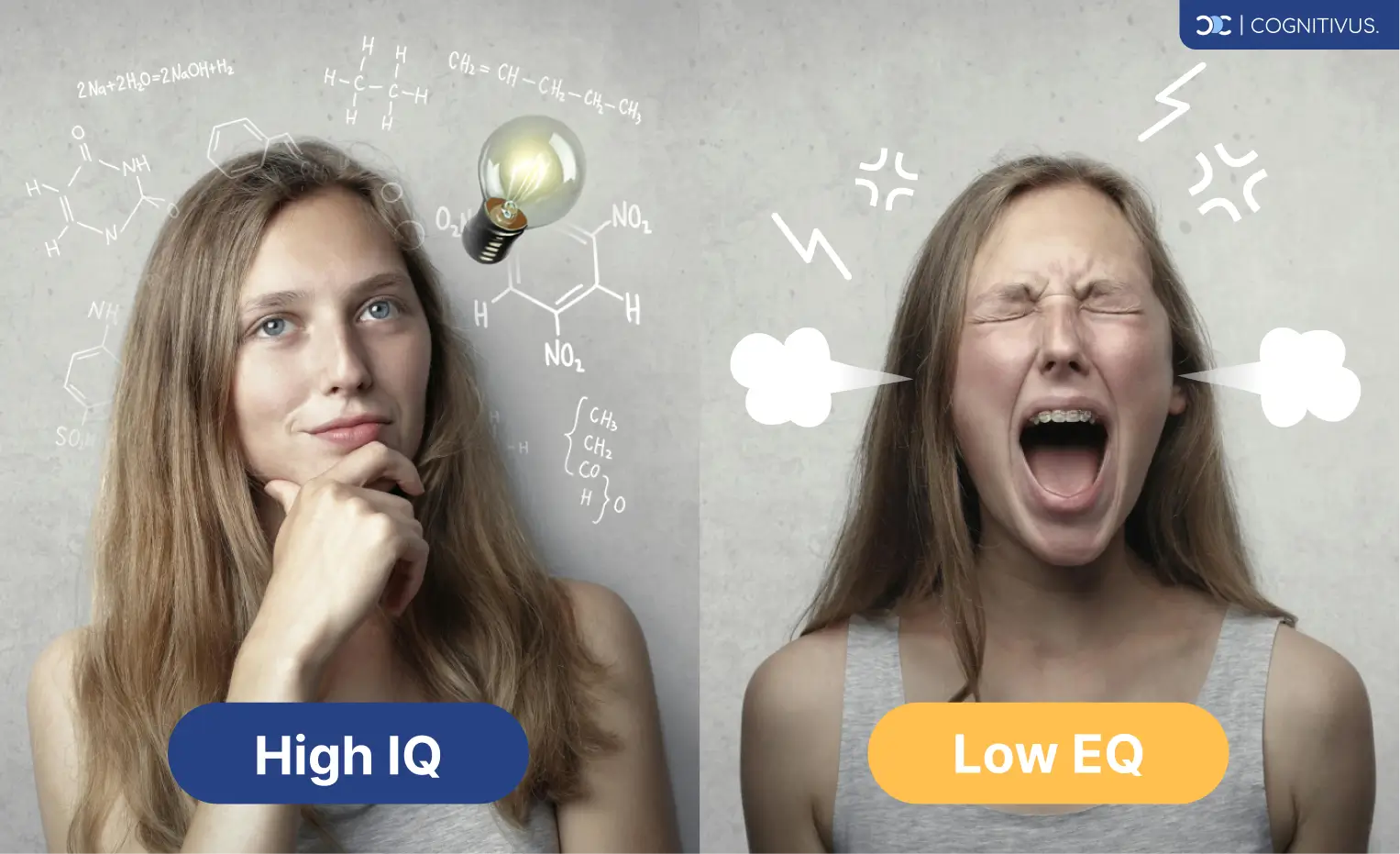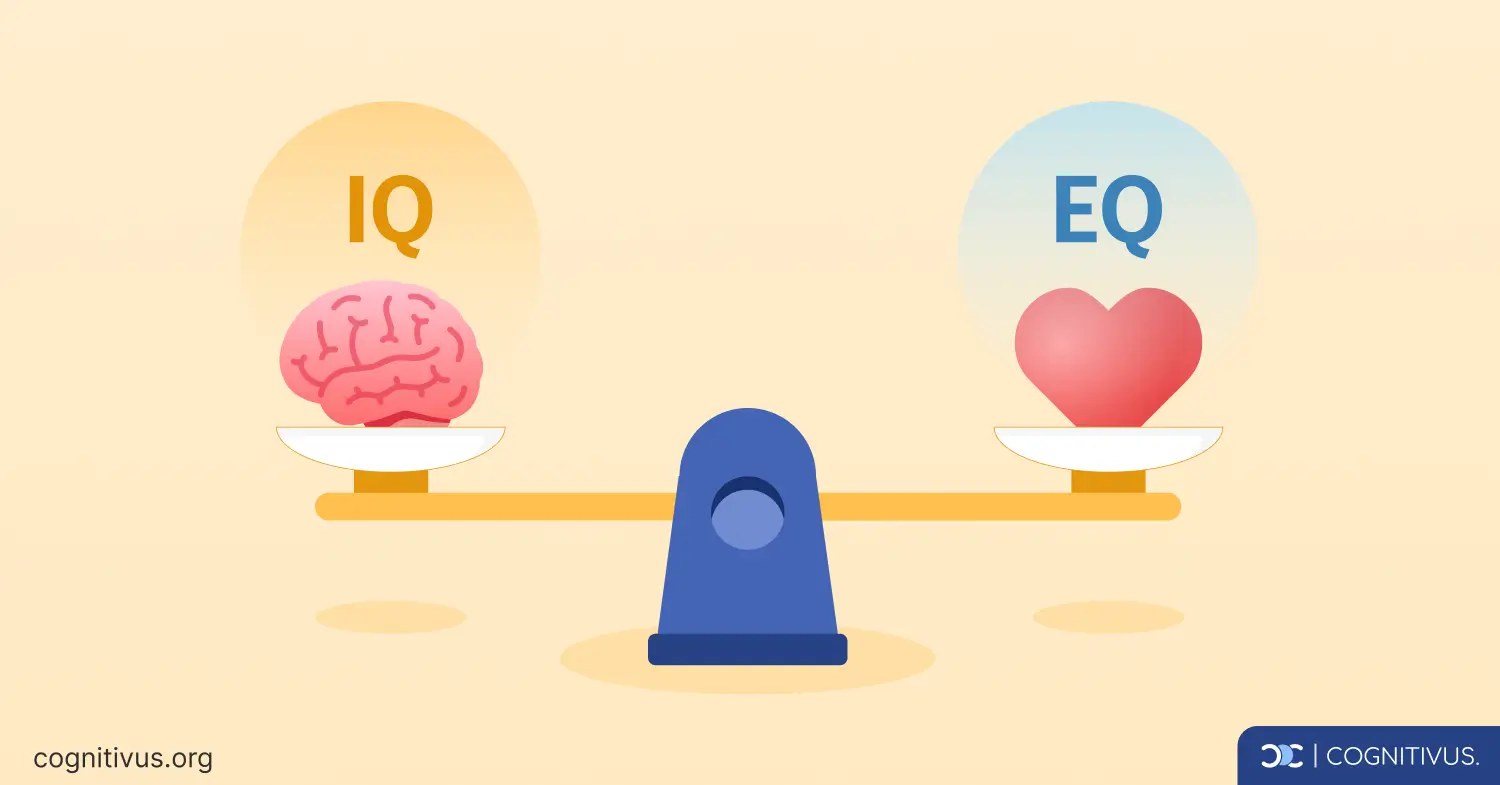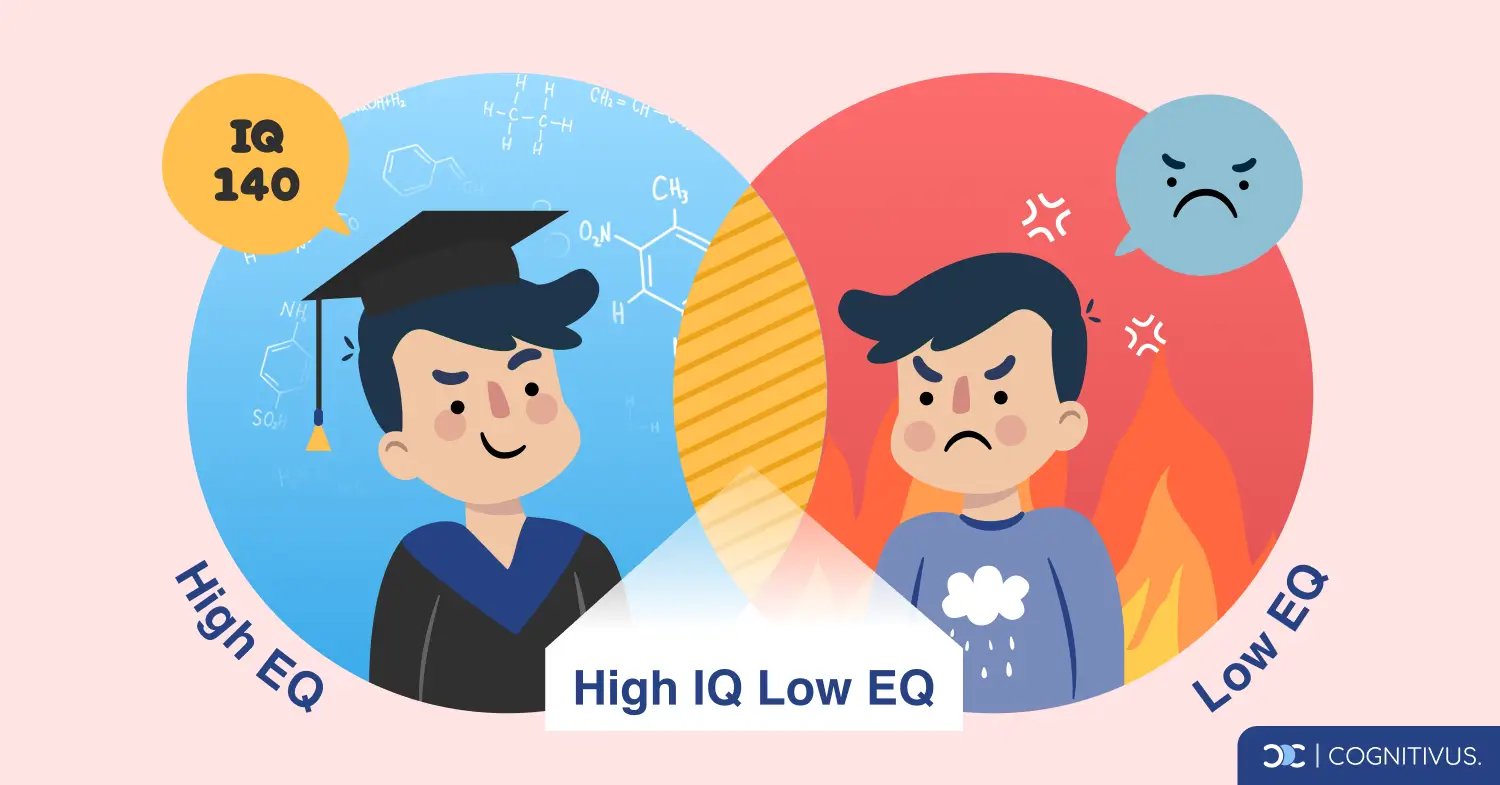Many highly intelligent people excel at complex tasks but struggle with emotions – both theirs and others'. This phenomenon, known as the high IQ low EQ paradox, is both intriguing and challenging. People with a high Intelligence Quotient (IQ) often receive praise for their cognitive abilities.
However, if their Emotional Quotient (EQ) is low, they may find it difficult to understand and manage emotions, leading to challenges in forming friendships and working effectively with others.
High IQ and Low EQ: Definition, Signs and Causes
What it means to have high IQ but low EQ
People with high IQ but low EQ might impress with their intellectual capabilities, such as logical thinking, problem-solving, and learning new information quickly. Typically, they excel in academic settings. However, they might struggle in emotional and social situations. They may find it difficult to navigate conflicts or understand the emotional cues of others. These people may struggle with friendships and social interactions.

Sometimes it may affect their professional life too, as emotional intelligence plays an often-underrated role in the workspace, especially in leadership positions. Research shows that emotional intelligence is crucial for positive outcomes at work. It leads to better commitment to the organization, higher job satisfaction, and improved job performance. For example, employees with higher emotional intelligence are more committed to their jobs, feel more satisfied at work, and perform better. On the other hand, low emotional intelligence is linked to higher job stress, showing that EQ is important for managing stress at work. Additionally, studies have shown that higher emotional intelligence is associated with better health, both mental and physical.
10 signs of high IQ but low EQ
Now that we’ve clarified what a high IQ combined with a low EQ means, let’s explore some of the most common signs that someone might have a high IQ but a low EQ:
1. Difficulty expressing emotions
People with high IQs but low EQs often struggle to express their feelings. While they can solve complex problems with ease, discussing emotions can be challenging. They might come across as aloof or detached, not because they don't care, but because they find it difficult to express their emotions.
Imagine a brilliant scientist who can explain complex theories but can't express feelings of gratitude or love to their family.
2. Struggles with empathy
High IQ individuals with low EQ may find it hard to understand others' feelings. For example, they might offer logical solutions instead of empathetic responses when someone shares personal challenges.
If a friend is upset, they might suggest a practical solution rather than offering a comforting hug or words of support.
3. Preference for solitude
Such individuals often prefer their own company over social gatherings. They find satisfaction in their thoughts and ideas and may feel drained by social interactions.
A software developer might prefer working alone on complex coding tasks rather than attending team-building events.
4. Misunderstanding social cues
They might miss or misunderstand social cues like facial expressions, body language, and tone of voice, leading to awkward interactions and misunderstandings.
They might not notice when someone is bored or uncomfortable during a conversation, continuing to talk about a topic that doesn't interest the other person.
5. Difficulty forming deep relationships
Forming deep, meaningful relationships can be challenging for people with high IQs but low EQs. They may have several acquaintances but struggle to navigate the emotional complexities required for deeper connections.
They might have many professional contacts but few close friends who understand their emotional world.
6. Experiencing emotional outbursts
These individuals might bottle up their emotions until they reach a tipping point, resulting in emotional outbursts. This isn't a sign of immaturity but rather a difficulty in managing emotions effectively.
A normally calm engineer might suddenly explode in anger over a minor issue because they haven't expressed their frustration earlier.
7. Overthinking and anxiety
High IQ individuals with low EQ often overthink and experience anxiety. Their analytical minds dissect every situation, but they struggle to manage the emotions attached to these situations.
They might spend hours worrying about a small mistake they made at work, fearing it will have significant consequences.
8. Difficulty with change
Change can be particularly challenging for these individuals. They may prefer predictability and routine, finding it hard to adapt to new situations due to the emotional upheaval that change often brings.
A high IQ person might resist changes in their work environment because they find comfort in familiar routines.
9. Strong desire to learn and improve
Despite their challenges, individuals with high IQs and low EQs often have a strong desire to improve their emotional intelligence. They are open to learning and growing, which is an admirable quality.
They might read books or attend workshops on emotional intelligence to better understand and manage their emotions.
10. Stagnation in career advancement
Even with their intellectual brilliance, individuals with high IQs but low EQs may find themselves stagnating in their careers. Emotional intelligence is crucial for building relationships, leading teams, and navigating workplace dynamics. Without strong EQ, they may struggle with collaboration and leadership, which are essential for career growth.
A highly intelligent manager might struggle to advance because they can't effectively lead their team or handle workplace conflicts.
While these signs can be helpful to detect a high IQ combined with a low EQ, you can also adopt a more pragmatic approach by taking an IQ test and measuring your emotional intelligence.
What are the causes of low EQ?
Understanding the causes of low EQ can help in identifying ways to improve it. Here are some key factors:
1. Overemphasis on intellectual development
Some people spend a lot of time and energy developing their intellectual abilities. In short, they prioritize IQ over EQ. They might excel in academics, solving complex problems, or mastering new skills. However, this intense focus on cognitive skills can sometimes come at the expense of developing emotional skills. They might not prioritize learning how to understand and manage emotions, both their own and others'.
A student who spends all their time studying and neglects social activities might excel academically but struggle with social interactions.
2. Lack of emotional education
Emotional intelligence isn't always taught explicitly, especially during childhood. If someone grows up in an environment where emotional expression and understanding are not encouraged or modeled, they might not learn these important skills. Without guidance on how to handle emotions effectively, it can be difficult to develop a high emotional intelligence.
A child who grows up in a household where emotions are not discussed might not learn how to express or manage their feelings properly.

3. Mental health issues
Mental health conditions can also impact emotional intelligence. For instance, anxiety, depression, or personality disorders might make it harder for individuals to perceive and manage their emotions. Marina Fiori at the University of Lausanne has conducted research highlighting how these issues can affect emotional intelligence, making it more challenging for some people to develop these skills.
Someone with anxiety might find it difficult to manage stress or understand their own emotions, affecting their overall EQ.
4. Personality traits
Certain personality traits can influence emotional intelligence. For example, people who are naturally more introverted might find it more difficult to engage in social interactions that require high EQ. Similarly, individuals who are very analytical might focus more on logical reasoning than on emotional understanding.
An introverted person might prefer solitary activities over social ones, limiting their opportunities to develop social and emotional skills.
How to Boost Your Emotional Quotient (EQ)
Improving your EQ involves deliberate effort and self-reflection. This journey can significantly enhance your relationships, mental well-being, and overall life satisfaction. Here’s a comprehensive guide on effective strategies to boost your EQ and real-life success stories illustrating the impact of high EQ.
1. Develop emotional awareness
Start by becoming more aware of your own emotions. Pay attention to what you feel in different situations and try to understand the triggers behind those feelings. Journaling your emotions can help you track patterns and gain insights into your emotional responses.
2. Expand your emotional vocabulary
Learn to articulate your feelings more precisely by using higher emotional intelligence vocabulary. Instead of using broad terms like "happy" or "sad," try to use more specific words like "elated," "frustrated," or "anxious." This precision can help you understand your emotions better and communicate them more effectively to others.
3. Practice empathy
Put yourself in others’ shoes to understand their feelings and perspectives. Listening actively and attentively to others without interrupting or judging can foster deeper connections and improve your interpersonal relationships.
4. Improve your social skills
Engage in activities that require interaction with others, such as joining clubs, volunteering, or participating in group projects. These experiences can help you practice and refine your social skills, making you more adept at navigating social situations.
5. Manage your emotions
Learn techniques to regulate your emotions, such as deep breathing, meditation, or mindfulness. These practices can help you stay calm and composed in stressful situations, allowing you to respond thoughtfully rather than react impulsively.
6. Seek feedback
Ask for feedback from friends, family, or colleagues about how you handle emotions and interactions. Constructive feedback can provide valuable insights and help you identify areas for improvement.

7. Reflect and adjust
Regularly reflect on your emotional experiences and interactions. Consider what went well and what could have been handled better. Use these reflections to adjust your approach and continue growing your EQ.
FAQ: Addressing Common Queries About IQ and EQ
Is it common for someone to have both high IQ and high EQ?
In my line of work, I've met plenty of people who've got the whole package: they're not just brainy but also really get the emotional side of interactions. It's a mix that some people think is rare, but actually, it's more common than you'd expect. This kind of balance usually comes from a mix of where you've been, what you've learned, and just putting in the effort to get good at a bunch of different skills. Being a whiz in one area doesn't mean you can't be awesome in another.
Does high EQ translate into more happiness?
Yes! There's a pretty clear connection between being a pro at handling your feelings and feeling good about life. Being sharp when it comes to emotional intelligence – like getting your own emotions and picking up on others' – is super important for keeping relationships solid and rolling with life's punches smoothly.
Research backs this up, especially looking at tricky times like being a teenager. These studies point out that knowing how to figure out what you're feeling and how to deal with those emotions makes a huge difference. It helps people bounce back from tough spots, make strong connections with others, and generally enjoy life more. So, it turns out that being emotionally savvy is a big deal for being happy.

How to improve EQ with a low IQ
If you've ever struggled with puzzles or felt like those traditional IQ tests just don't get you, you might be wondering if you can still be a star when it comes to emotional smarts, or EQ. Let me tell you straight up: EQ isn't tied to how you score on any IQ test. Even if you feel you have a low emotional intelligence, you can absolutely grow it, no matter where you stand with traditional measures of smarts like IQ tests. It's all about putting in the effort.
Getting better at EQ means expanding your emotional vocabulary, getting really good at recognizing and understanding those feelings, and getting the hang of how to handle emotional encounters. In addition, there are a few habits you can adopt in order to improve your EQ.
Can a high IQ and a high EQ coexist?
It's not only possible to have both high IQ and high EQ, but it can be incredibly beneficial.. obviously! High IQ allows individuals to solve complex problems and think deeply, while high EQ helps them understand emotions and navigate social situations effectively. People who balance both can strategize intelligently and connect empathetically, making them exceptionally well-rounded.



